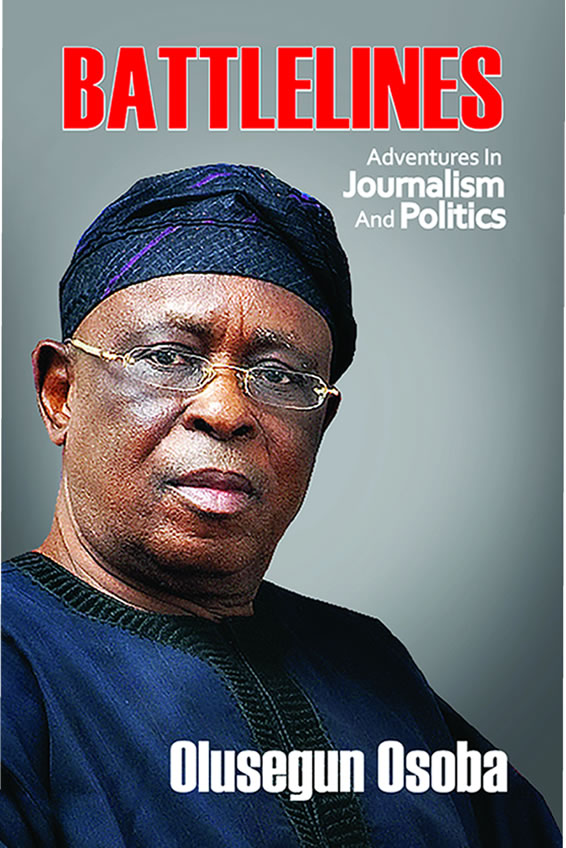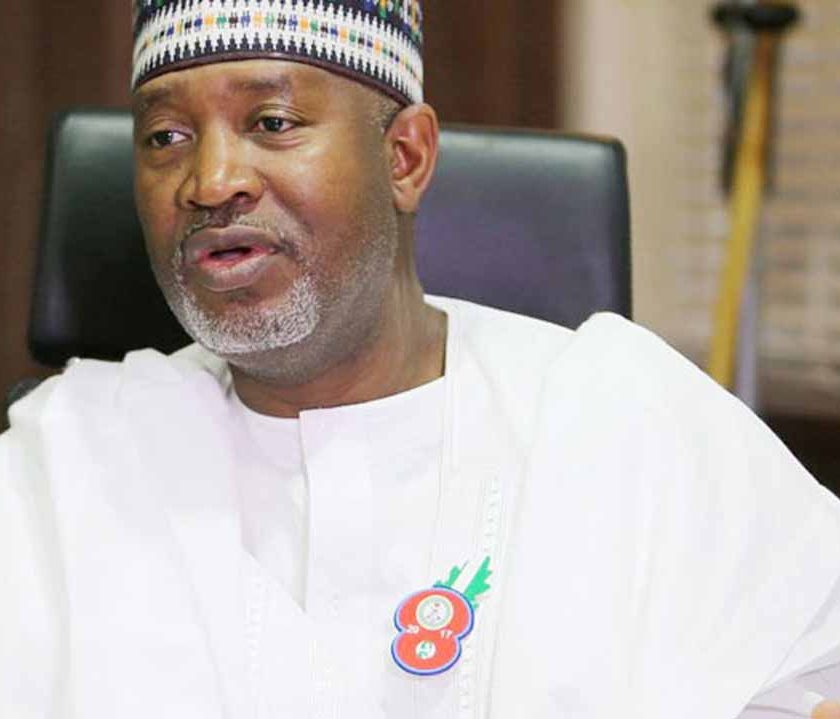Former governor of Ogun State, Chief Olusegun Osoba, has given a clear insight into the circumstances surrounding the birth of the National Democratic Coalition (NADECO) that served as catalyst for the struggle over the annulled June 12, 1993 election that culminated in Nigeria’s return to civil in 1999.
In a new book entitled “Battle lines: Adventures in Power,” the seasoned administrator and journalist narrated how, when he and other eminent citizens, at the risk of their lives, mobilised to defend the sanctity of the mandate as the late head of state, General Sani Abacha, became deadly against pro-June 12 forces.
In the book, which contains 19 chapters, Osoba gave a breathtaking account of the ordeals that led to the anti-cancellation of the election acknowledged as the freest and fairest in the annals of Nigeria.
Osoba recalled: “As we mobilised against the regime, there were several formal and informal groups formed by people working for the actualisation of the June 12 mandate. I was in a small group with Dr Chukwuemeka Ezeife, Chief John Oyegun and Dr Doyin Okupe.
“But the Abacha security goons were monitoring the activities of the pro-democracy and civil rights groups all over the country, particularly in the South-West.
“The turning point for Abiola was the inauguration of President Nelson Mandela in South Africa on May 10, 1994, which Abiola attended. He had reportedly received an equivalent of a hero’s welcome at the ceremony to the chagrin and embarrassment of the official Nigerian delegation led by General Abacha himself.
“The major organisation that emerged in this period which helped to shape the anti-military and pro-democracy movement was the National Democratic Coalition (NADECO). NADECO was roughly a product of another organisation which existed before the June 12 crisis.
“This was the Committee for Unity and Understanding (CUU). The overriding motive of CUU was the campaign for power shift from the North to the South. It was started not long after the Babangida transition-to-civil-rule programme started. Founders and key members of the CUU included Admiral Ndubuisi Kanu, Chief Sam Mbakwe, Mr Ayo Opadokun, Chief Edward Kobani, Chief Lulu Briggs, Commodore Ebitu Ukiwe, Alhaji Abdulazeez Ude, Ambassador Tanko Yusuf and General Theophilus Danjuma.
“However, when the June 12 election was annulled, the CUU, in conjunction with such groups as the Movement for National Reformation (MNR), led by Chief Anthony Enahoro, Egbe Ilosiwaju Yoruba, led by General Adeyinka Adebayo, Afenifere led by Chief Michael Ajasin, the Progressive Alliance for Justice and Unity (PAJU), Justice Forum and National Patriotic Front (NPF) and several other pro-democracy and human rights groups like Beko Ransome Kuti’s Campaign for Democracy came together to form NADECO in General Adeyinka Adebayo’s house, GRA, Ikeja. Papa Ajasin emerged as the leader of the new group. The group now included politicians and activists throughout the country who were committed to the validation of the June 12 presidential election results. This was on May 15, 1994.
“Eventually, 49 people representing these organisations signed the document establishing NADECO with the following preambles:
“Whereas the military as an institution is essentially authoritarian and cannot, therefore, midwife democracy in Nigeria; whereas the Nigerian political class which has been abused, subverted and humiliated in the past ten years for cooperating and working with the military political agenda, how now realised that there is no alternative to democracy in Nigeria; now therefore, the leaders of the major democratic and progress organisations and eminent Nigerians hereby resolve to create a nationwide, broad-based political reform where all democratic and progressive forces can find accommodation for a joint struggle for the restoration of democracy and true federalism in Nigeria.”
The founding 49 signatories to NADECO were: Chief Michael Adekunle Ajasin, Mallam Lawal Dambazzau, Commodore Ebitu Ukiwe, Chief Anthony Enahoro, Major General Adeyinka Adebayo (retd.), Chief Bola Ige, Commodore Dan Suleiman, Dr Chukwuemeka Ezeife, Professor Anya O. Anya, Colonel Yohanna Madaki, Reverend Father Moses Adasu, Dr Beko Ransome-Kuti, Reverend Tunji Adebiyi, Chief Ade Ojo, Chief Ralph Obioha, Chief Empire Kanu, Chief Michael Anyiam, Dr. Sola Soile, Vice Admiral Akin Aduwo, Chief E. Duru, Mr. Nick Dazzang, Mr. Labaran Maku, Dr A. A. Akingba, Mr Babas Eko Oyekanmi, Mr Alex Ayatolla, Mrs Sarah Jubril, Alhaji Ganiyu Dawodu, Mr O. P. Edodo, Mr A. Barber, Otunba Olabiyi Durojaiye, Chief Olusegun Osoba, Chief John Odigie-Oyegun, Prof. Bolaji Akinyemi, Alhaji Mohammed Siraj Hamza, Dr. Wahab Dosunmu, Otunba Aboyade Cole, Major General Olufemi Olutoye (rtd), Chief Sobo Sowemimo, Dr. Steve Achema, Chief Olaniwun Ajayi, Chief Olu Falae, Brigadier-General Jonah Jang, Chief Abraham Adesanya, Chief Ayo Adebanjo, Mr. Alao Aka-Bashorun, Mr. Emmanuel Njiwah, Chief Vincent Nwizugbo and Dr. Uma Eleazu.“When Abiola returned from South Africa in May 1994 he was renewed and re-energizsed. NADECO leaders invited him to a meeting where he was asked to confirm if he was ready to actualise his mandate and lead the struggle.
Arrested in my house
“Soon after NADECO was formed in May 1994, I was arrested in my house and became the first of many others to follow later. I called the BBC correspondent on my mobile phone to announce my arrest which was immediately relayed live on the BBC Radio World Service as I was being driven to the police headquarters in Kam Salem House, Lagos, where I would be detained.
“The security agents were everywhere looking for other NADECO leaders to arrest. The man in charge of my interrogation was one Auta, a deputy commissioner of police. I was left in very humiliating condition in a large, rat-infested office where about twenty policemen had their desks. Once the policemen closed for the day, the big rodents took over. A combination of four desks served as my orthopaedic bed.
“However, I was lucky that one of the commissioners of police at Kam Salem House, then Prince Rilwanu Babatunde Akiolu – who later became the Oba of Lagos as Oba Rilwanu Babatunde Akiolu 1 – gave me the key to his office and asked me to sleep there every night.“I was grateful for this but was apprehensive that I could put Akiolu in trouble if found to be aiding and abetting an ‘enemy’ of the regime. He asked me not to worry. I also used his office phone to contact my colleagues in the struggle.
Later, Commodore Dan Suleiman and I were charged to court for forming an ‘illegal organisation called National Democratic Coalition (NADECO).’ Interesting enough, the man who led our defence in court was Chief Abraham Adesanya, himself a leading member of that ‘illegal organization.’ Others like Chief Enahoro and Dr Beko Ransome-Kuti of the Campaign for Democracy were also arrested. Former Governors Bola Ige and Balarabe Musa were also detained with us briefly.”
Source: tribuneonlineng.com





